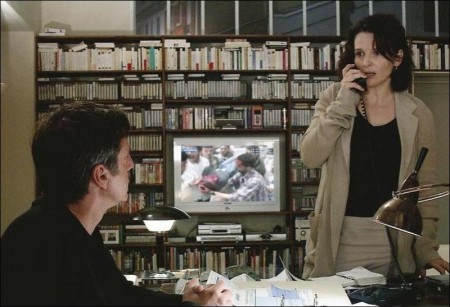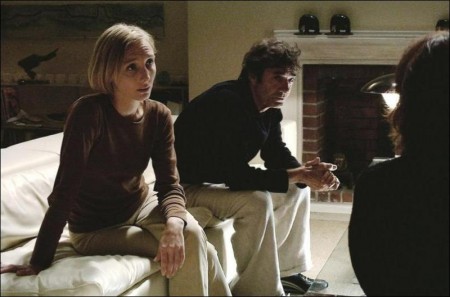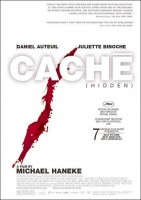Georges (Daniel Auteil), a television talk show host, and his wife Anne (Juliette Binoche), are living the perfect life of modern comfort and security. One day, their idyll is disrupted in the form of a mysterious videotape that appears on their doorstep. On it they are being filmed by a hidden camera from across the street with no clues as to who shot it, or why.
As more tapes arrive containing images that are disturbingly intimate and increasingly personal, Georges launches into an investigation of his own as to who is behind this. As he does so, secrets from his past are revealed, and the walls of security he and Anne have built around themselves begin to crumble.
Juliette Binoche (Anne)
An international star of extraordinary, almost otherworldly beauty, French actress Juliette Binoche was born in Paris. The daughter of a sculptor/theater director and an actress, Binoche studied acting at the National School of Dramatic Art of Paris. Following graduation, she followed her mother’s footsteps and became a stage actress, occasionally taking small parts in French feature films.
Binoche first earned recognition in 1985 for playing a modernized, teenaged version of the Virgin Mary in Jean-Luc Godard’s controversial “Je Vous Salue, Marie/Hail Mary.”
The actress became a French star the same year with an acclaimed performance in André Téchiné’s “Rendez-Vous.” And though the darling of the 1985 Cannes Film Festival, Binoche gained true international acclaim when she played Tereza in Philip Kaufman’s “The Unbearable Lightness of Bein” in 1988.
Binoche was cast in a lead role in filmmaker Leos Carax’s chilling “Mauvais Sang/Bad Blood.” Binoche appeared in his “Les Amants du Pont-Neuf,” a film they began in 1988 finish in 1991.
Binoche had great success starring opposite Jeremy Irons in “Louis Malle’s Damage” (1992). The same year, the actress appeared with future English Patient co-star Ralph Fiennes in a new film version of “Wuthering Heights,” and followed that with the lead role in Krzysztof Kieslowski’s “Blue.” (She also appeared briefly in the trilogy’s other installments, “Red” and “White”).
Binoche returned in 1995 with “Le Hussard sur le Toit / The Horseman on the Roof.” In 1996, she earned further international recognition with a Best Supporting Actress Oscar (as well as a host of other awards) for her role in “The English Patient.” Returning to her native France amidst a golden haze of critical acclaim, Binoche appeared in the same year’s “Un Divan a New York,” a romantic comedy in which she starred opposite William Hurt. In 1998, she again collaborated with director Téchiné, this time on the romantic drama “Alice et Martin.”
Revered as near royalty by the French press (who often simply refer to her a La Binoche) and a beloved star worldwide, Binoche’s remarkable second wind found her popularity soaring and her screen presence more powerful than ever. Binoche’s daring and intense performance as 19th century literary icon George Sand in the drama “Children of the Century” indeed impressed audiences and critics.
Binoche was cast in “The Widow of Saint-Pierre” The redemption-themed drama perform smashingly at the international box-office and also found it’s star earning a Cesar nomination for Best Actress.
A teaming with filmmaker Michael Haneke resulted in the intersecting lives drama “Code Unknown” (2000). Binoche gave a captivating performance that same year in the art-house hit “Chocolat.” Cast as the freespirited owner of a chocolate shop located in a small French town, the dedicated actress actually prepared for the role by learning to make chocolate at a popular Paris sweet shop.
The film was an international runaway hit, and the beloved starlet was nominated for Best Actress awards across the globe. Following a lighthearted performance opposite French icon Jean Reno in the romantic comedy “Jet Lag,” Binoche most recently appeared with American star Samuel L. Jackson in director John Boorman’s political oriented drama “In My Country.”
Juliette currently lives in France with her two children.
Michael Haneke
Michael Haneke was born in 1942. He studied philosophy, psychology and theatre in Vienna. From 1967-1970 he worked as a playwright with Südwestfunk (ARD). Since 1970 he has been a freelance director and screenplay writer, as well as worked on theatre productions in Stuttgart, Düsseldorf, Frankfurt, Hamburg, Munich, Berlin and Vienna.
Michael Haneke Films
1974 After Liverpool (TV) director & screenplay (based on a radio play by James Saunders)
1975 Sperrmüll (TV) director
1976 Drei Wege zum See (Three paths to the lake, TV) director & screenplay (based on the novel by Ingeborg Bachmann)
1979 Lemminge (Lemmings, TV) director & screenplay (part 1: Arkadien / part 2: Verletzungen)
1982 Variation (TV) director & screenplay
1984 Wer war Edgar Allan ? (Who was Edgar Allan ?, TV) director & screenplay (based on the novel by Peter Rosei)
1985 Fraulein (TV) director & screenplay (based on an idea by Bernd Schroeder)
1988 Der Siebente Kontinent ( The Seventh Continent) director & screenplay
1991 Nachruf für einen Mörder (Orbituary for a murderer, TV) director & screenplay
1991/92 Bennys Video director & screenplay
1992 Die Rebellion (TV) director & screenplay (based on the novel by Joseph Roth)
1993/94 71 Fragmente einer Chronologie des Zufalls (71 fragments of a chronology of chance) director & screenplay
1996/97 Das Schloss (The castle) director & screenplay (based on the novel by Franz Kafka)
1996/97 Funny Games, director & screenplay
1999/2000 Code Unbekannt (Code Unknown) director & screenplay
2000/2001 Die Klavierspielerin (The Piano Teacher) director & screenplay (based on the novel by Elfriede Jelinek)
2002 Wolfzeit (Time of the Wolf) director & screenplay
2004 Caché (sortie prevue oct/nov 2005) director & screenplay
These production notes provided by Sony Pictures Classics.
Caché (Hidden)
Starring: Juliette Binoche, Daniel Auteuil, Maurice Bénichou, Annie Girardot, Bernard Le Coq, Walid Afkir, Daniel Duval, Nathalie Richard, Aïssa Maïga
Directed by: Michael Haneke
Screenplay by: Michael Haneke
Release Date: December 23, 2005
MPAA Rating: R for brief strong violence.
Studio: Sony Pictures Classics
Box Office Totals
Domestic: $3,647,381 (22.5%)
Foreign: $12,550,443 (77.5%)
Total: $16,197,824 (Worldwide)


